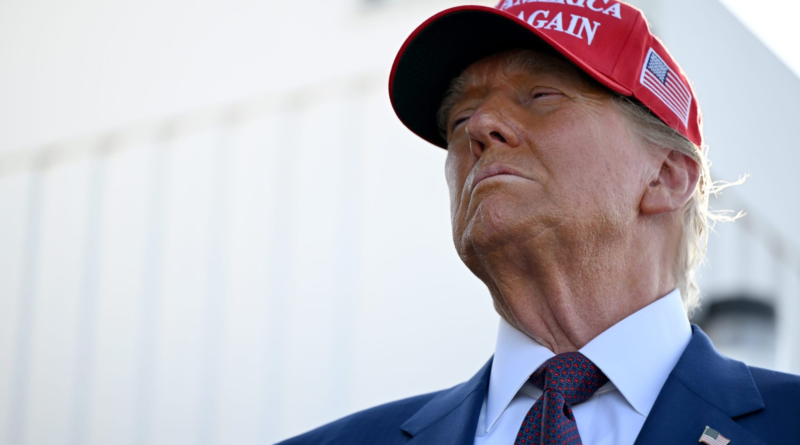Trump fires the first salvo of his renewed trade war with China: A 10% across-the-board tariff
U.S. president-elect Donald Trump made his first pledges on trade policy since winning the presidential election, taking to Truth Social to pledge new duties on imports on China, Mexico and Canada soon after taking office in January. Throughout his campaign, Trump promised steep tariffs on China and other major trading partners as a way to bring jobs back to the U.S.
On Monday evening, Trump said he would impose an additional 10% tariff on all imports from China, on top of existing duties.
Trump blamed alleged Chinese inaction in controlling the flow of illegal drugs into the U.S. “I have had many talks with China about the massive amounts of drugs, in particular Fentanyl being sent into the United States—But to no avail,” he wrote. “Representatives of China told me that they would institute their maximum penalty, that of death, for any drug dealers caught doing this but, unfortunately, they never followed through.”
In response to Trump’s threatened tariffs, Chinese officials said that China-U.S. economic cooperation is “mutually beneficial,” an argument officials often use in response to U.S. policies targeting the world’s second-largest economy. “No one will win a trade war or a tariff war,” Liu Pengyu, the spokesperson for China’s embassy in the U.S., said on Monday.
In addition to new duties on imports from China, Trump also threatened 25% tariffs on goods entering the U.S. from Mexico and Canada, due to illegal immigration and drug smuggling. He promised that the tariffs would remain in place until such activities ceased.
Asian markets largely shrugged off Trump’s tariff threat. Japan’s Nikkei 225 dropped 0.8%, while Korea’s KOSPI is down 0.6%. Chinese equity markets, including Hong Kong, were flat.
The fentanyl issue
Opioid overdose, particularly from fentanyl, is one of the leading causes of death in the U.S., killing about 75,000 people last year according to the U.S. Centers for Disease Control and Prevention.
The flow of illegal fentanyl has been a sticking point in relations between the U.S. and China during both the first Trump administration and the following Biden administration. U.S. drug enforcement officials allege that fentanyl, illegally produced in China, are shopped into the country through Mexico.
In 2019, Beijing added all fentanyl-related substances to a list of controlled narcotic drugs, which officials said would provide a solid legal basis to crack down on fentanyl trading.
China then agreed to control the exports of chemicals used to make fentanyl precursors in November 2023, following a San Francisco meeting between Chinese President Xi Jinping and U.S. President Joe Biden.
On Monday, Liu, the Chinese embassy spokesperson, refuted allegations that China is knowingly allowing fentanyl precursors to enter the U.S., noting that Chinese and U.S. counternarcotics agencies have been in regular communication since the San Francisco summit.
Trump’s renewed trade war
Trump leaned heavily into tariffs during his campaign for the presidency, pledging to impose tariffs as high as 60% on goods coming in from China. Trump argued that tariffs could both bring manufacturing jobs back to the U.S. as well as raise new tax revenue. Yet many economists believe that tariffs will instead stoke inflation, with the tax burden falling on U.S. consumers.
The first Trump administration first imposed tariffs on Chinese imports in 2018; the Biden administration largely kept those tariffs in place, and imposed new taxes, such as a 100% import duty on Chinese electric vehicles.
China’s economy is in a difficult position, even without Trump’s threatened tariffs. Beijing is dealing with an extended property crisis, sluggish domestic consumption, and relatively high youth unemployment.
Before the election, Goldman Sachs economists predicted that a 60% blanket tariff could shave two percentage points off China’s GDP growth.
Trump’s tariff announcement follows his decision to appoint hedge fund manager Scott Bessent as his treasury secretary. While Bessent was the market’s favored choice, he has also signaled an openness to tariffs, seeing them as a negotiating tool to pressure trading partners and as a way to offset tax cuts.
Companies will need to start preparing for a more protectionist approach from the U.S. under a second Trump administration, predicted Nick Marro, principal economist for Asia at the Economist Intelligence Unit, in a anoteon Tuesday.
“Trump changes his mind on many things, but tariffs—and tariffs on China, specifically—are one of the key areas of ideological consistency that we’ve seen from him over the past 10 years,” Marro wrote. “As a result, companies and investors should be thinking about how to prepare for the worst.”


 This year in odd news: The weirdest headlines from the Houston area in 2022 – KPRC Click2Houston
This year in odd news: The weirdest headlines from the Houston area in 2022 – KPRC Click2Houston 

